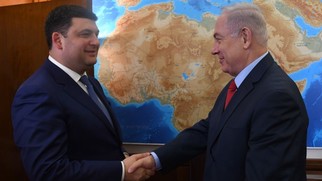 Ukraine’s prime minister Volodymyr Groysman was in Israel this week, holding meetings with his Israeli counterpart Benjamin Netanyahu. The two are the world’s only Jewish prime ministers. “This is a moment of great friendship because there is a common history that binds Ukraine and Israel. Some of it is laced with tragedy, but it is also laced with hope and sympathy,” Netanyahu said. Around 500,000 of Israel’s 8.5 million inhabitants have roots in Ukraine. Many arrived during the early decades of the Jewish state, but the number of Ukrainian immigrants to Israel has surged since the war in the east of the country began. Since 2014, some 19,000 Ukrainians have made Aliyah, or moved to Israel. Every month or so, a chartered plane arrives carrying a few hundred more new immigrants. The story of 26-year old Alena Sapiro from Donetsk echoes that of many others. “In Ukraine, I had a flat, a job, a boyfriend, and a cat. I had everything. I finished university with two degrees. I started to study for a doctorate and wanted to be a teacher at the university. But then my university was bombed. My best friend was killed in the war, and my stepfather was also killed. My mother told me, ‘Go away from here,’” she told Tel Aviv-based journalist Larry Luxner. Valery Nevler, aged 24, says he left Ukraine just in time. “There was fighting in the streets. I got one of the last trains to Lviv [in western Ukraine] and a few days later the train station in Donetsk was hit by a missile attack.” He does not regret his move. In Ukraine, he says, “People’s salaries are not enough even to buy food, not to mention paying taxes and rent. So many people who are stuck in Donetsk would love to go to a peaceful place, but they don’t have money, so they stay.”* Netanyahu was not always so enthusiastic about Ukraine. Last year Ukraine supported a UN resolution condemning Israel’s settlement policies in the West Bank and Netanyahu cancelled Groysman’s planned visit in December 2016, straining relations between the countries. Groysman came to power last year, becoming Ukraine’s first Jewish prime minister. He was born in 1978, so avoided the toughest constraints inflicted on Jews by the Soviet regime. Despite the growing nationalism in Ukraine that has prompted a rise in anti-Jewish attacks, Groysman dismisses assertions of widespread anti-Semitism. “Ukrainian citizens have a good will and are nice people. Ukraine is my country. It’s a great honour to be a citizen and born in Ukraine,” he said during his visit to Israel. Of his Jewish background, Groysman says, “I believe it would be humiliating to hide someone’s roots, to hide someone’s family or last name.” He stressed the close relations between Kiev and Israel and emphasised that the world should stand on the side of democratic Ukraine against Russian aggression. *Interviews published by the Atlantic Council
0 Comments
Leave a Reply. |
Keeping stories aliveThis blog aims to discuss historical events relating to the Jewish communities of Ukraine, and of Eastern Europe more widely. As a storyteller, I hope to keep alive stories of the past and remember those who told or experienced them. Like so many others, I am deeply troubled by the war in Ukraine and for the foreseeable future, most articles published here will focus on the war, with an emphasis on parallels with other tumultuous periods in Ukraine's tragic history. Archives
March 2024
Categories
All
|
 RSS Feed
RSS Feed
